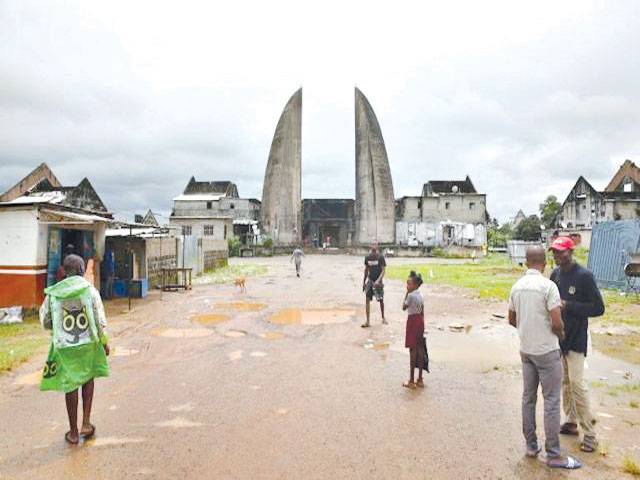Libreville - Every day in Gabon’s capital Libreville, dozens of children use wheelbarrows to bring jerry cans full of water to families living on the site of a grandiose failure. The International Centre of Bantu Civilisations (CICIBA) was meant in the 1980s to become a cultural showcase, but its sprawling premises have instead today become home to hundreds of poor families. The concrete walls have decayed, patched-up electrical cables hang between shacks, and trash cans are piling up along the road. “More than 2,000 people live here” in great precarity, says Apollon Mekoghi, president of the association of squatters of the CICIBA. The centre was created to safeguard the heritage of African peoples living south of the equator. Eleven countries - Angola, Burundi, Central African Republic, Comoros, Congo Brazzaville, Democratic Republic of Congo, Equatorial Guinea, Gabon, Rwanda, Sao-Tome and Principe, and Zambia - joined forces to create a vast database accessible to both researchers and the general public.
The aim was to promote the culture of the Bantu tribes, present in central and southern Africa, who share linguistic roots as well as certain traditions and beliefs. At the instigation of the late president Omar Bongo Ondimba, host country Gabon spent more than $17 million to start building the cultural centre in the north of Libreville. Two huge concrete elephant tusks were set up to guard the entrance, and a theatre was built. But then the funds ran out, as countries wracked by civil war were unable to finance the rest of the project.
The CICIBA became a white elephant, an outsized project that never saw the light of day. Only a few of the planned buildings ever made it out of the ground, before being left abandoned for several years.
The first squatters arrived in 2013. Mekoghi said he first moved to the site after the university campus where he was previously living was destroyed.
“I found myself homeless, so I came here,” said the head of the squatters’ association. More than 400 families now live in the CICIBA. “As soon as someone wants to settle in, he submits his application,” explains Mekoghi. He then does a quick background check to see if they are in the country legally. “If he is accepted, he can come and build his home.” Makeshift shanties without running water dot the alleys of the centre, a veritable labyrinth that spans several levels. The inhabitants sometimes crowd a dozen at once into a few square meters, providing fertile ground for the spread of diseases, such as typhoid fever. Francoise Moughola, 40, has lived in the shanty town for seven years. A mother of 12 children, she has just lost her husband. “It’s hard for all of us,” she says, busy washing and ironing clothes. “I don’t know how to live with twelve kids, I can’t even afford to get them into school.” In Gabon, secondary school enrolment costs around 10,000 CFA francs ($16).
The vast majority of residents are Gabonese, but some squatters are foreigners.
They include Sika, a 34-year-old Central African who arrived in 2016 after fleeing civil war in his country.
He says life is tough. “We have water delivered only once a day by tankers. It’s not enough,” he says. “We sometimes have to choose between washing or cooking.” Gabon, a small nation of about 2.1 million souls along central Africa’s Atlantic coast, is one of the continent’s largest oil producers and one of the wealthiest countries per capita in the region.
But the World Bank said a third of the population was living below the poverty line in 2017. Along the alleys of the abandoned cultural centre, there are bars, stalls and even churches.
Squatters are not charged rent, but must pay 20,000 CFA francs (about $33) each month for electricity. The power is cut off as soon as the inhabitants are unable to pay.
Friday, April 19, 2024
A white elephant project in Gabon provides shelter for squatters

Minister advocates for IT growth with public-private collaboration
9:57 PM | April 19, 2024
Judges' letter: IHC seeks suggestions from all judges
9:55 PM | April 19, 2024
IMF urges Italy, France to spend less, Germany to loosen purse strings
8:57 PM | April 19, 2024
PM calls UAE president, admires Emirati leadership's response to recent Dubai rains
8:55 PM | April 19, 2024
Church leader calls for including Christians in Gandhara Corridor
8:50 PM | April 19, 2024
A Tense Neighbourhood
April 19, 2024
Dubai Underwater
April 19, 2024
X Debate Continues
April 19, 2024
Hepatitis Challenge
April 18, 2024
IMF Predictions
April 18, 2024
Kite tragedy
April 19, 2024
Discipline dilemma
April 19, 2024
Urgent plea
April 19, 2024
Justice denied
April 18, 2024
AI dilemmas unveiled
April 18, 2024
ePaper - Nawaiwaqt
Advertisement
Nawaiwaqt Group | Copyright © 2024





